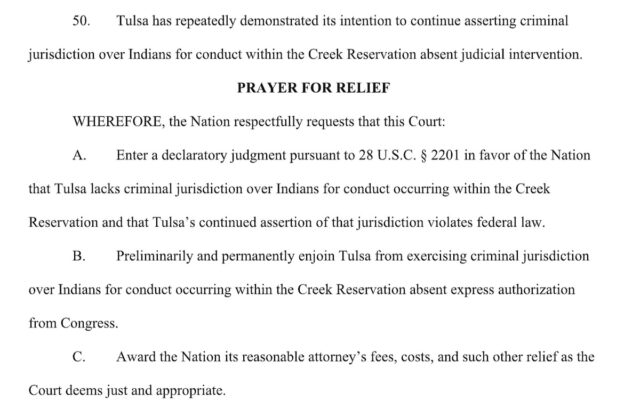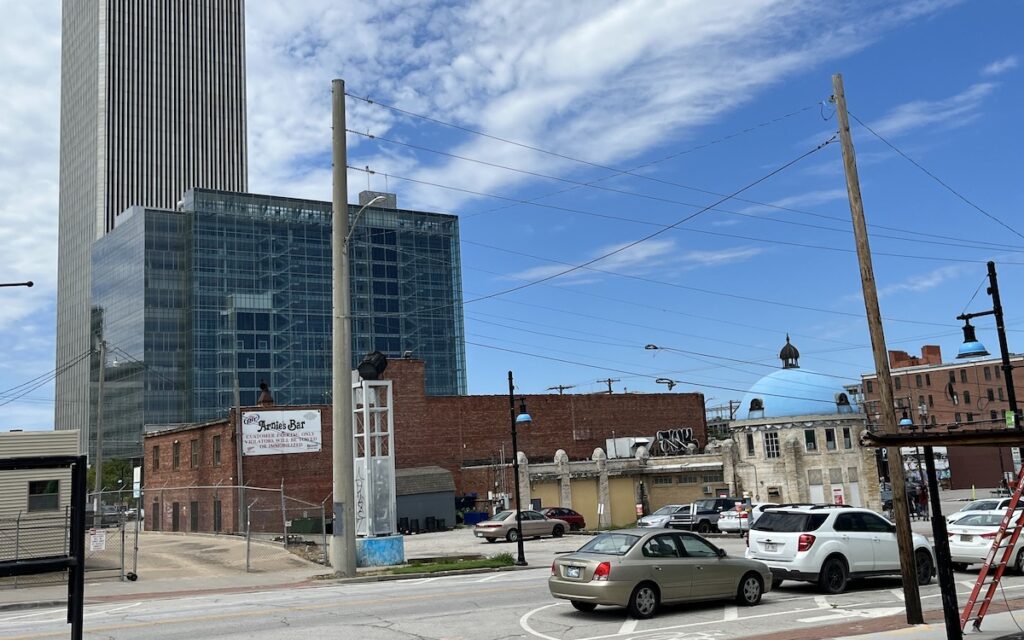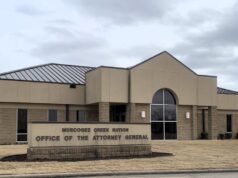
In the latest development on the question of whether cities and towns in eastern Oklahoma have jurisdiction to adjudicate local infractions by tribal citizens in municipal court, the Muscogee (Creek) Nation filed a lawsuit against the City of Tulsa in the U.S. District Court for the Northern District of Oklahoma today, arguing the city’s continued assertion of criminal jurisdiction over tribal citizens violates federal law.
“Tulsa’s ongoing criminal prosecutions of Indians for conduct within the Creek Reservation are causing irreparable injury to the nation by interfering with its sovereignty and undermining the authority of its own criminal justice system, including the authority of its attorney general, Lighthorse Police, and courts to prosecute under the nation’s own laws criminal offenses committed by Indians within its Reservation,” the petition filed Wednesday states. “Tulsa has made plain, by word and deed, that absent judicial intervention it will persist with its unlawful prosecutions.”
Wednesday’s lawsuit comes as other questions about state-tribal jurisdiction continue to be the subject of public policy discussions, including a dispute over motor vehicle license plates issued by some tribes. In the three years since the U.S. Supreme Court’s ruling in McGirt v. Oklahoma affirmed the continued existence of the Muscogee Nation Reservation — and, subsequently, other reservations in eastern Oklahoma — a series of civil law questions have arisen.
Now, the latest lawsuit comes three months after the U.S. Supreme Court denied the city’s application for a stay in the Hooper v. City of Tulsa case, which was remanded back to the U.S. District Court for the Northern District of Oklahoma after a federal appellate court said the lower court erred in applying the Curtis Act to claim the city has jurisdiction to adjudicate municipal offenses against tribal citizens.
While a cross-deputization agreement between the Muscogee Nation and the City of Tulsa authorizes Tulsa police officers to write tickets and make arrests, Muscogee leaders have argued that those offenses must be handled in tribal court instead of the city’s court system.
In a statement Wednesday, Muscogee Nation Chief David Hill said Tulsa is adjudicating cases involving tribal citizens owing to “make-believe legal theories.”
“Our nation has always been a leader in the fight to defend tribal sovereignty. We continue to welcome government-to-government cooperation with the City of Tulsa,” Hill said. “But we will not stand by and watch the city disregard our sovereignty and our own laws by requiring Muscogee and other tribal citizens to respond to citations in Tulsa city court because of the city’s make-believe legal theories.”
Geri Wisner, the Muscogee Nation attorney general, said the city is “knowingly violating federal law.”
“We filed this suit today because the City of Tulsa is willingly and knowingly violating federal law,” Wisner said. “There is no legal basis for current city policies dealing with citizens of tribal nations and we are asking the court to require the city to follow the law.”
Michelle Brooks, director of communications for the City of Tulsa, provided a statement in response to the lawsuit.
“As Mayor Bynum stated two weeks ago in his State of the City address, he is eager to work with tribal partners to resolve these issues and render litigation unnecessary,” Brooks said. “This latest lawsuit is a duplication of several lawsuits that are already pending in state and federal courts to decide these issues. As such, the City of Tulsa has no further comment at this time.”
Follow @NonDocMedia on:
Hooper v. City of Tulsa case remains pending

In 2018, Justin Hooper, a Choctaw Nation citizen, received a $150 speeding ticket within Tulsa’s city limits and the boundaries of the Muscogee Nation. In July 2020, the U.S. Supreme Court affirmed the Muscogee Nation as an Indian Country reservation. Five months after the SCOTUS ruling, Hooper filed an application for post-conviction relief, arguing that Tulsa lacked jurisdiction to prosecute him for the offense.
After the federal district court initially dismissed the case in Tulsa’s favor, Hooper appealed to the 10th Circuit Court of Appeals. The appellate court reversed the district court’s ruling in June, arguing that Section 14 of the Curtis Act — a law predating Oklahoma statehood — no longer applies and, therefore, could not be cited to claim Tulsa retains jurisdiction to adjudicate city rules and regulations.
The City of Tulsa requested a formal stay of the appellate ruling, which was briefly granted in August before ultimately being rejected by U.S. Supreme Court Justices Brett Kavanaugh and Samuel Alito, who essentially deemed the stay unnecessary.
In the lawsuit filed Wednesday, attorneys for the Muscogee Nation argued that the city has continued to prosecute crimes committed by Native Americans within reservation boundaries, despite the 10th Circuit’s mandate in June.
“The Tenth Circuit’s mandate in Hooper notwithstanding, Tulsa has continued to assert criminal jurisdiction over Indians for conduct within the exterior boundaries of the Creek
Reservation,” the brief states.
The nation’s attorneys also argued that the City of Tulsa has adhered with the McGirt decision’s jurisdictional requirements for other offenses, just not traffic violations.
“After McGirt, the City of Tulsa began referring felony and criminal misdemeanor offenses by Indians within the Creek Reservation to the Creek Nation for prosecution. From Jan. 1, 2023, to Oct. 31, 2023, for example, the Creek Nation received 2,618 such referrals from the City of Tulsa Police Department,” the complaint states. “Tulsa has generally declined to refer just one category of offenses: traffic offenses.”
In its request for relief, the Muscogee Nation is asking a federal judge to:
Enter a declaratory judgment pursuant to 28 U.S.C. § 2201 in favor of the nation that Tulsa lacks criminal jurisdiction over Indians for conduct occurring within the Creek Reservation and that Tulsa’s continued assertion of that jurisdiction violates federal law.
Preliminarily and permanently enjoin Tulsa from exercising criminal jurisdiction over Indians for conduct occurring within the Creek Reservation absent express authorization from Congress.
Award the nation its reasonable attorney’s fees, costs, and such other relief as the Court deems just and appropriate.
Read the Muscogee Nation petition
 Loading...
Loading...
(Update: This article was updated at 3:45 p.m. Wednesday, Nov. 15, to include a statement from Michelle Brooks, director of communications for the City of Tulsa.)





















